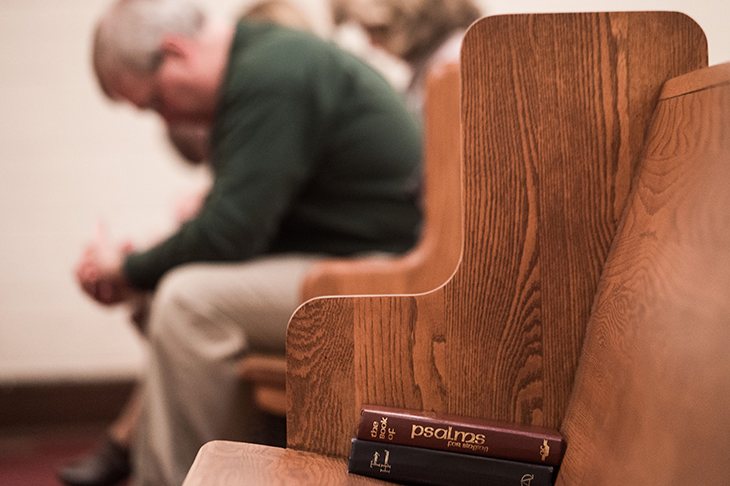Amedia fracas broke out this past week over Julia Baird’s reports on the ABC about links between Christian teachings and domestic violence against women. My personal experiences as an Anglican pastor resonated with much that Baird reported. She made valuable points about the impact of particular Christian teachings and Bible verses on some women, such as the injunction in St Paul’s letter to the Ephesians for wives to ‘submit’ to their husbands. I did not see her work as an attack on Christianity.
However Baird’s findings, which included harrowing interviews with victims of abuse, were overshadowed by disputes about a report she gave of American research findings concerning the connection between Christian faith and domestic abuse. This report was headlined by the ABC as: ‘Research shows that the men most likely to abuse their wives are evangelical Christians who attend church sporadically.’
Andrew Bolt challenged Baird’s use of the American research in the Herald Sun and on Sky News. He pointed out that the research she cited actually shows that the more people are involved in church, the less domestic violence they commit. This consistent finding confirmed by multiple studies works against, not in favour of, her core thesis that Christian teachings can make domestic violence worse.
The plot thickened when Steven Tracy, the researcher Baird named as her source for the American findings, came to her defence with a follow-up article for the ABC. On the other hand, W. Bradford Wilcox, who had conducted the primary research upon which Tracy had himself relied, condemned Baird’s report in the Australian as ‘illogical, unfair and quite possibly inaccurate’. She had, Wilcox said, painted a ‘relentlessly negative picture of the influence that Christianity has had on domestic violence’.
In this controversy, a careful examination of the chain of evidence reveals a ‘Chinese whispers’ effect in the way research findings have been distorted. In this chain Steven Tracy was the weakest link. Baird had crucially relied on an article published by Tracy in 2008, and quoted Tracy’s statement that ‘It is widely accepted by abuse experts that… evangelical men who sporadically attend church are more likely than men of any other religious group (and more likely than secular men) to assault their wives’. This report Tracy referenced back to a footnote in one of his earlier articles, published in 2007, in which he had referenced five studies of domestic violence, four from North America, and one from New Zealand. All five studies reported an inverse association between church attendance and domestic violence. However only one report – Soft Patriarchs, New Men, by Wilcox – had reported that nominal conservative Protestant men were more abusive towards their wives than non-affiliated men. (Wilcox’s research had also found that active conservative Protestant men were the least abusive of all the categories he investigated.) Of the remaining four studies, one by Brinkerhoff, Grandin and Lupri found that religious denomination was not significant for predicting abuse, and that conservative Christian men do not abuse their partners more than other Christian men. Furthermore, the New Zealand study reported that the worst abusers were not nominal Christians, but non-churchgoers.
In both his 2007 and 2008 articles, Tracy appears to have misrepresented evidence from his own referenced sources. Far from it being ‘widely accepted’ that nominal conservative Protestants are the worst abusers, only one of the five studies he himself referenced supported his conclusion, and two contradicted it.
Both Tracy and Wilcox are experts in their respective fields, but Wilcox is the sociologist who did the primary research. Tracy, the theologian, got out of his depth when he attempted to summarise the social science findings. He latched onto one study which was in conflict with two other studies he also cited, and then claimed he was reporting a ‘widely accepted’ consensus.
When Tracy leapt to Baird’s defence by confirming that she had cited him accurately – which was true – what was missing was self-awareness about having misreported the primary research of others. Writing for the ABC he said ‘Baird and Gleeson cited precisely what I found in the published research’. Not so. They merely reported what Tracy said he had found. Baird should have chased down Tracy’s footnoted references and checked the primary findings rather than relying on Tracy’s analysis.
It is also regrettable that Tracy’s brief literature survey did not make mention of studies showing that non-religious factors can have a greater influence on domestic violence than religious attributes. For example, a 2007 research report by Ellison et al. compared the impact of race and religious observance in America. The authors’ research showed that, while increased Christian observance was associated with less abuse across all racial groups, the association of racial difference with domestic violence was stronger than religious factors.
Furthermore, since none of the American studies referenced by Tracy had made comparisons between Christianity and other faiths, it was misleading for Tracy to claim that evangelical men were more likely to assault their wives ‘than men of any other religious group’.
Since non-religious factors can show a stronger association with domestic violence, and differences between religions were not taken into account in the research Baird relied on, it was particularly egregious that the ABC’s headline stereotyped one type of evangelical man as the group most likely to abuse their wives.
Wilcox and Tracy’s polar opposite responses to Baird’s work, the one denouncing, and the other praising it, are a parable of our times. In recent years a replicability crisis has been raging in the social sciences. Meta-research studies have found that an embarrassingly high proportion of published research has non-replicable results.
Mix all this up with the culture wars, the feminist critique of patriarchy pummelling away at Christianity, and you can quickly get a toxic, chaotic mess into which truth quietly sinks from view.
This is a salutary lesson about how a few sloppy footnotes can be amplified into a media headline trumpeting an odious stereotype as if it were a proven fact.
Caveat lector.
Got something to add? Join the discussion and comment below.
Get 10 issues for just $10
Subscribe to The Spectator Australia today for the next 10 magazine issues, plus full online access, for just $10.
You might disagree with half of it, but you’ll enjoy reading all of it. Try your first month for free, then just $2 a week for the remainder of your first year.














Comments
Don't miss out
Join the conversation with other Spectator Australia readers. Subscribe to leave a comment.
SUBSCRIBEAlready a subscriber? Log in